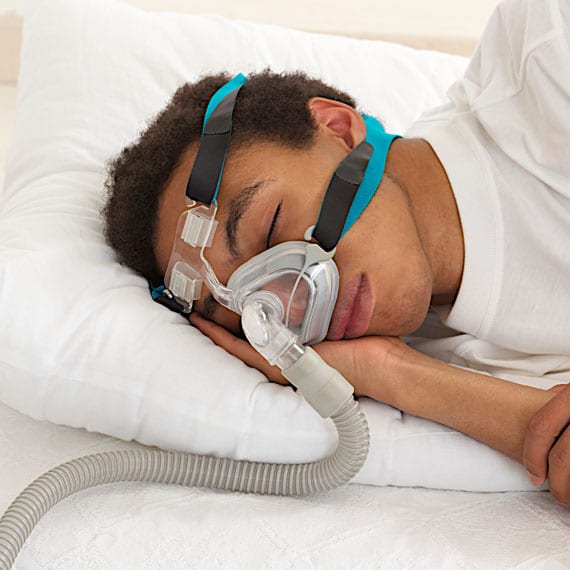
What Happens if I Don't Treat My Sleep Apnea?
Sleep apnea refers to a group of severe sleep disturbances. It causes you to stop breathing briefly and happens periodically throughout sleep. According to an NCBI study, the most prevalent type of sleep-related respiratory disease is obstructive sleep apnea (OSA). It is distinguished by recurrent bouts of full or partial upper airway blockage. Sleep apnea diagnosis can be alarming for people, many of whom may need to undertake dietary, exercise, and environmental adjustments to correct the sleep issue.
Many patients may be tempted to do nothing in the face of these adjustments. On the other hand, sleep apnea may negatively influence the health and well-being of patients if left untreated.
Sleep apnea health concerns
Sleep apnea happens when your muscles relax while you sleep. Soft tissue behind the throat collapses, obstructing the airway. Breathing cessations may last anywhere from 10 seconds to a minute or more. The pauses are disrupted as the body abruptly awakens to gasp for air. This pattern of breathing keeps repeating throughout the night. A severe sleep apnea patient may experience hundreds of breathing pauses per night. These breathing interruptions disrupt sleep and cause significant changes in blood pressure and oxygen levels. Untreated sleep apnea may cause considerable stress on the body over time. This may trigger the risk for a variety of other health concerns. We’ve highlighted some of the common health hazards associated with sleep apnea below:
Higher risk of cardiovascular diseases
Sleep apnea can significantly impact a patient’s cardiovascular health because the pulmonary system is tightly related to the respiratory system. Sleep apnea patients are more likely to develop hypertension, thrombosis, and even a stroke than persons who do not have a sleeping issue. Sleep apnea may exacerbate high blood pressure in patients who already have it. Your body becomes distressed when you wake up frequently at night. This causes your hormone systems to enter a state of excessive activity, raising your blood pressure. Treatment, on the other hand, can make a significant difference. Some patients who receive treatment for sleep apnea may observe an improvement in their blood pressure. In addition to medications, a balanced diet rich in fresh foods and vitamins may enhance overall cardiovascular health.
Weight gain
Excess weight increases your chances of developing sleep apnea. Moreover, the condition makes it more challenging to lose weight. Obese patients may develop fatty deposits in their neck that prevents them from breathing regularly at night. On the other hand, sleep apnea can cause your body to produce more of the hormone ghrelin. This causes you to crave carbohydrates and candies. When you are always weary, you may not effectively convert the food you consume into energy. This might contribute to weight gain. Treatment for sleep apnea may make you feel better and give you more stamina for workouts and normal daily activities. This can assist you in losing weight, which can aid in the treatment of sleep apnea.
Diminished mental health
Sleep apnea patients are more prone to show indications of weariness because they cannot get enough rest. This might appear as physical exhaustion, but it can also emerge as emotional and mental issues. Sleep apnea has been linked to mood changes, melancholy, and irritation. Exhaustion can be reversed, and these symptoms may be alleviated with regular therapy and lifestyle adjustments.
Greater likelihood of dangerous situations
In addition to the risks to your health and well-being, undiagnosed and untreated sleep apnea may pose a threat to public health. Daytime weariness may be caused by untreated sleep apnea, impairing focus and attention. It may also cause you to fall asleep accidentally, resulting in job mishaps or car accidents. Motorists who have untreated sleep apnea can endanger themselves and others on the road. Truckers usually on the road late at night may pose a similar risk.
Threat of impotence
The vital systems and internal organs rely on appropriate rest, maintenance, and hormone production. Typically, this may be accomplished by a good diet, light exercise, and a regular sleeping routine. However, sleep apnea affects sleep time, reducing testosterone levels in males who have the illness. Furthermore, persons suffering from the disease usually don’t obtain enough oxygen, leading to impotence.
Frequently Asked Questions
What Are The Other Types Of Sleep Apnea?
Aside from obstructive sleep apnea, the following are the typical kinds of sleep apnea:
- Central sleep apnea happens when your brain fails to deliver appropriate signals to the muscles that regulate your respiration. This implies that you may not be able to breathe for a little amount of time. You may awaken with shortness of breath or have difficulty falling or staying asleep.
- Complex sleep apnea syndrome, also known as treatment-emergent central sleep apnea, occurs when a patient experiences obstructive and central sleep apnea. In complex sleep apnea syndrome, central apneas continue or reappear after obstructive episodes have been eliminated with positive airway pressure (PAP) treatment.
Conclusion
Managing sleep apnea is the first step toward avoiding associated diseases and other lifestyle difficulties in sufferers. If you feel drowsy during the day or have trouble sleeping at night, you may need to see your doctor. There are several therapy options for sleep apnea to help manage your symptoms. Although surgery is an option for treatment, patients can also choose from various successful noninvasive methods. Your doctor may advise you to use a CPAP machine for continuous positive airway pressure. The equipment, which includes a mask connected by a hose, can help you breathe better at night and get more sleep. It might take a while before you get used to it. However, individuals who use it before bed usually feel better and healthier. Other therapies like mouth appliances and nerve stimulators are available to keep your airways open. Your doctor will propose a treatment plan that includes lifestyle modifications and additional therapy.

